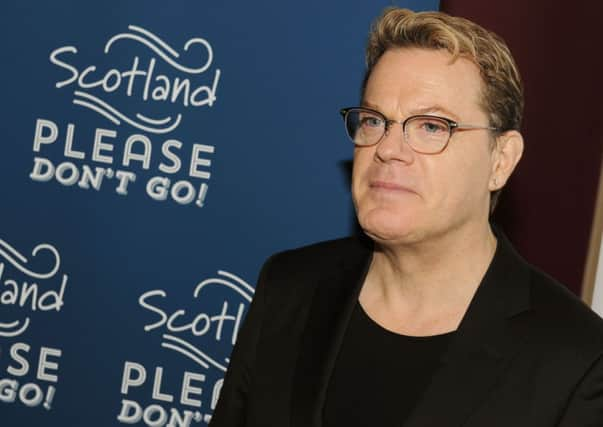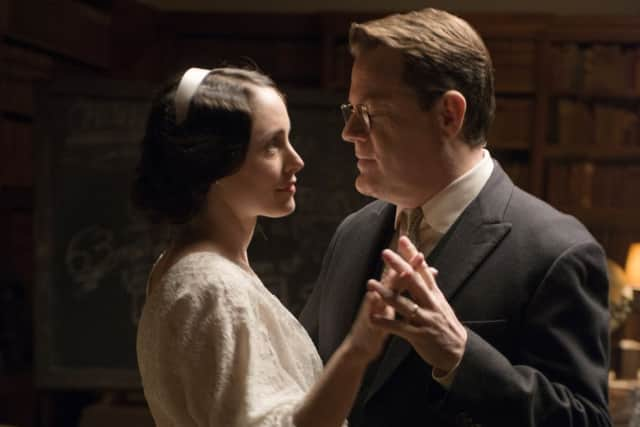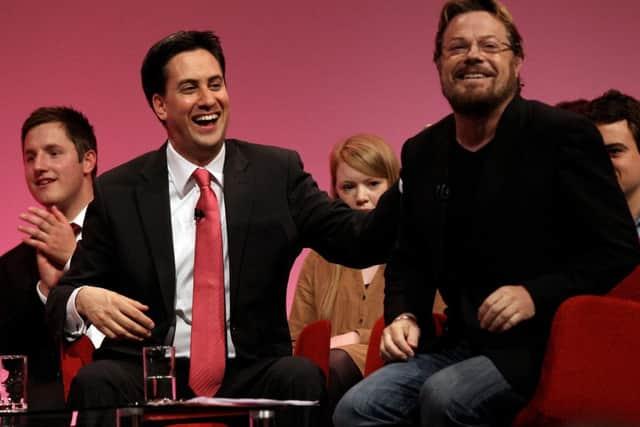Eddie Izzard on politics and experiencing hatred


Eddie Izzard seems like a man perpetually on a mission. Take his recent D-Day stand-up shows in Normandy. Having planned to take two days off from the US leg of his Force Majeure world tour to fly to France and pay his respects on the 70th anniversary (he was there for the 60th and 65th anniversaries as well), he decided at the last minute (well, a month or so before) to task himself with performing three shows for charity, one after the other, in English, French and German.
“It was a little weird doing a German gig in Caen, in Normandy,” says Izzard, sounding remarkably fresh for a man who was in France less than 72 hours earlier and is now on the line from Chicago, where – in a spot of “Phil Collins at Live Aid”-style transatlantic endurance gigging – he’s since performed two sold-out shows, with a third later today. “I knew that I was only going to get a handful of people in for the German show. I wanted ten; I got 12. But the venue was a rock’n’roll venue, there was a wonderful atmosphere, and I had my youngest ever audience member: a little kid who was two. Her parents spoke German, but they were actually Scottish and Russian and I vowed that I would be back on the 75th anniversary to do four languages: Russian, German, French and English.”
Advertisement
Hide Ad

As a committed Europhile with an international worldview, it’s precisely this kind of mission that seems to drive Izzard. His determination to launch a concurrent career as an actor may have boosted his global profile considerably (he’s just worked with Dustin Hoffman on the upcoming Boychoir, will appear in Monty Python-star Terry Jones’s new film Absolutely Anything and is currently creeping audiences out as a psychiatrist acolyte of Hannibal Lecter’s in the acclaimed – and very bloody – US drama series Hannibal). But performing the trilingual shows on D-Day slammed home something he’s known instinctively for much of his career: humour is fundamentally human.
“It’s the references that are national,” elaborates Izzard. “So I just use universal ideas now. Initially, going into other countries and doing comedy in other languages is the fog of war: you don’t know what’s going to work and what isn’t going to work – but gradually you work it out from doing it. And I’ve worked it out now.”
Has he worked out where his fascination with the Second World War comes from as well? He does reference it quite a lot. “I think it’s just built in,” he says. “I was in the cadets at school, but I was doing special courses because I was considering an officer cadetship. And I developed an encyclopaedic knowledge of the Special Air Service as well because I wanted to be in the SAS. So I think it’s just a part of me.
“Like the acting/transvestite part of me,” he continues, with a laugh. “When they get the genome out – they’re testing my genome at the moment – and when they finally get the code of what everyone is, I’m sure there will be a transvestite gene in there, but there will also be a military gene. And I’ve got the determination one too.”


Though the acting/transvestite gene obviously trumped the military one in terms of his subsequent path in life (the line’s too crackly for me to tell if he’s joking or not about the genome testing), he reckons running marathons – such as the 43 he did in 51 days for Sport Relief in 2009 – has come closer to satisfying his desire to be in the army than, say, being part of a big Tom Cruise war movie such as Valkyrie. “I was thinking I don’t really see the link, but if you do get to play someone like Erich Fellgiebel [one of the German conspirators in the plot to assassinate Hitler] then that is quite a weird thing.”
As it happens, Izzard’s latest film role is also Second World War-related. In Castles in the Sky, which receives its world premiere at the Edinburgh International Film Festival on Monday, he plays Robert Watson-Watt, the Brechin-born engineer who became the “father of radar” when his development of an early aircraft detection system proved instrumental in securing victory during the Battle of Britain.
Advertisement
Hide AdBeginning in 1935, the film dramatises Watson-Watt’s struggle to convince the establishment that radio waves transmitted into the atmosphere could be used to identify enemy aircraft by bouncing signals back to a series of base stations along the coast. Scorned for not having the right education (University College, Dundee) or the correct professional background (he was recruited while working for the meteorology department of the National Physical Laboratory in Slough), his ideas were initially dismissed as fanciful attempts to build “castles in the sky”.
“It is brilliant to be able to give him his due,” says Izzard. “There’s this hero of Scotland, or really a hero of Britain, who hasn’t been trumpeted enough. There was this thing going on in Westminster where they were really snooty to him. And he was also from the weather department, so he was coming up with ideas and playing around with stuff that turned into radar. He was thinking outside the box and I really like things to do with thinking outside of the box.”
Advertisement
Hide AdIzzard read a lot about Watson- Watt to get into character, and opted for an “educated Dundee accent” to help him figure out what made him tick. For the purposes of the film, though, he wanted to pay due deference to his Scottishness, so he reckons his version of Watson-Watt is probably more Scottish than the real one. “If you listen to his accent, he sounds more English.”
Izzard chose to stay in accent throughout the Edinburgh-based shoot – not out of any Method-style madness, but because he was surrounded by a lot of Glaswegians – among them director Gillies Mackinnon and co-stars David Hayman and Laura Fraser – whose accents, he says, got “in the way of my ear, which was tricky”.
Castles in the Sky isn’t set in Edinburgh, of course; it’s located on the south coast, where Watson-Watt lived and worked. Nevertheless, being able to make it in and around the capital was a bonus for Izzard. “I was a street performer at the Edinburgh Festival for 11, no, 12 festivals, so it was great to come back and do a film.”
Indeed, Edinburgh has been a focal point for Izzard – ever since deciding at 16 that comedy was a feasible career option. Making it a mission to perform at the Fringe, it was the reason he went to Sheffield University (so he could join a Footlights-style society and put on student revue shows at Edinburgh) and the reason he was kicked out a year later from his accountancy degree. It was in Edinburgh, too, that he received his first vaguely positive notice when an otherwise negative review in this paper provided him with the following out-of-context pull-quote: “Utterly unexpected and devastatingly funny”. Cheekily edited, to be sure, but in retrospect, a fairly prescient assessment of his future reviews, and something Izzard held onto until the genuine raves started appearing as he made it on the comedy circuit then segued into movies, theatre and TV. “Yes, I have to thank The Scotsman for that one,” he laughs. “Those were my wilderness years. And I had them right up front, so got them done and dusted: I came out as a transvestite; got nothing going; then eventually got everything going; so I should, hopefully, be able to avoid them again.”
He’s certainly not worried about facing further wilderness years in Scotland after announcing his support for the Better Together campaign in April with a benefit show for its Scotland, Please Don’t Go initiative. “I like the Scottish people,” he says. “I like people in general. I’m going into politics [last year he announced his plan to run for Mayor of London in 2020 on a Labour ticket] and people ask me why and I say, ‘Well I like people’. And I do. I find people fascinating. I have a lot of connections with Scotland. I’ve played nearly every major town and city and run eight marathons holding the Saltire – I don’t know how many Scottish people have done all that.
“And as I said – and I tried to articulate this as clearly possible: as a member of the United Kingdom, I’d like to say, ‘Please don’t go.’ That’s all I’m saying. Scotland has to decide. You have democracy. I would say that some people on the Yes side are so vehement they make it impossible for anyone to stand up and say: ‘Why not full devolution? Why not try that thing first?’ I don’t understand why that can’t be tried.”
Advertisement
Hide AdIf all this can make Izzard sound like he’s already on the campaign trail for his future Labour candidacy, his views are at least consistent with his general mission to break down barriers, not build them up. “We’ve done some amazing things in 300 years,” he says, slipping into the more surreal mode of his comic riffs. “We used to murder each other so much. And we don’t now.
“And whatever you do,” he adds, “whatever Scotland does, is fine. I will salute Scotland and support Scotland whatever it does. I just wanted to say, ‘Please don’t go’.”
Advertisement
Hide AdStill, it seems notable that, until JK Rowling – who was in the audience for his Edinburgh show – makes public her views a few days after I speak to Izzard, his has been one of the few high-profile voices from the arts world willing to take this side of the Indy Ref debate. Izzard is adamant that the silence is because of the hatred that’s been directed towards people expressing pro-Union views.
“It’s not nice to experience full-blown hatred. But as soon as I walked out the door as a kid wearing make-up, I got it, so I’ve actually been battle-hardened against hatred. But I’m not trying to get the Yes people in Scotland to hate me. I’m just saying: ‘Maybe this has to be said, because no one else is getting up.’ People are reluctant to because of the hatred. I talk to Scottish people who are positive about the union and are too scared to say anything. I’m sure this is a successful part of the SNP plan: if you can be that vehement about it then no one says anything.”
As much as his planned move into politics is about his love of people, though, it is also fuelled by a hatred of his own. “I hate extremists,” he says. “The extremists keep coming round. They happened in the Thirties and Forties and now we have Ukip, Le Front National, The Tea Party – they keep coming back. I hate these bastards. I need to fight.”
I ask if he’s seen the limits of being on the sidelines – advocating for a political party instead of being directly involved. “Yes. You can only get really good at politics by doing politics. So I’m going to donate at least a decade of my life to politics and hopefully do something positive.”
This, then, is the next mission. “If people look at my life, I’ve tried to think outside of the box, I’ve tried to work on things in a different way and come up with some positive ideas: doing three gigs in three hours in three languages on D-Day and giving the money to charity – I think that’s a positive way of doing things. At a time when lots of people are voting for Ukip I’m doing shows in German and French and English and saying: ‘We are all the same guys.’”
• Castles in the Sky is at the Edinburgh International Film Festival on Monday at the Filmhouse and on 28 June at Cineworld, see www.edfilmfest.org.uk